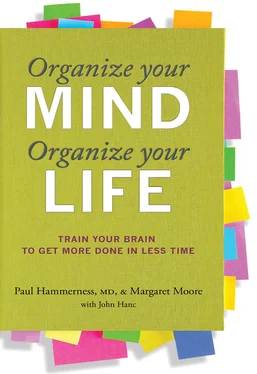Like Cesar says: quiet confidence.
2. Sustain Attention: Sustained focus or attention is a fundamental building block of organized behavior. You need to be able to maintain your focus and successfully ignore the many distractions around you in order to plan and coordinate behaviors, to be organized and to accomplish something.
In the process of sustaining attention, your brain scans the environment, directing your attention on a certain stimulus, while it continues to process other auditory and visual information. So while your attention rests on one thing (the speaker at the head of the conference table, for example, talking about an important new development at your company), your brain continues to evaluate new information (the rustle of papers to your left, the whispered comment to your right). This extraneous information (or “noise”) is competing for your attention, but the organized brain is able to instantly evaluate and screen out what is not worthy of your attention—to identify the signal through the noise. The sound of the papers and the side conversations are deemed unworthy of greater cognitive effort, but the person who rushes into the meeting saying, “Our CEO has just been led out of the building in handcuffs!” would go right to the top of the “Pay Attention!” list.
The ability to properly handle all the noise from the environment—and to evaluate and prioritize it while not being pulled off the main task at hand—is another basic and important sign of the organized brain.
3. Apply the Brakes: The organized brain must be able to inhibit or stop an action or a thought, just as surely as a good pair of brakes brings your car to a halt at a stop light or when someone cuts suddenly into your lane. People who don’t do this well struggle with suppressing what has turned out to be the wrong response or action. Often, it is very difficult at times to stop yourself in the middle of something. Here’s an example:
You’re working diligently on one task—say, your taxes. You’re sustaining your focus as you itemize your deductions and carefully read the forms. Meanwhile you’ve been subjected to an ongoing stream of distractions. Your spouse wants to know where you left the television remote. Your child has a homework problem. A coworker texts you with a question. Then, the phone rings. It’s your accountant, calling to ask for a meeting to go over your taxes. Your instinct is to forge ahead, because you really want to finish this tonight so you can watch your favorite television show, which is on tomorrow.
The organized brain says, “Stop now and schedule the meeting!” Yes, it would be easier and more convenient for you to just get it done now. But the organized brain has weighed the options. The organized brain remembers that last year you made a mistake on your tax forms and ended up paying $1,000 (not to mention $500 to your accountant, who had to redo everything). So the organized brain decides to put on the brakes. The function is called “inhibitory control,” and you could also think of it as a compassionate hand on the shoulder, or a sort of impulse control that keeps the efficient organized brain from getting off task and helps put you into a position for the next Rule of Order.
However you look at it—traffic cop holding up a raised hand or guidance counselor gently steering you away from an ill-advised task—you need to heed the message of the organized brain and stop in order to get to the next step.
4. Mold Information: Your brain has the remarkable ability to hold information it has focused upon, analyze this information, process it and use it to guide future behavior—even after the information is completely out of sight. This form of brain work involves something called representational thinking.
Efficient and organized people have the ability to retain and manipulate information or ideas. Like a computer-generated image suspended in space or a hologram in a sci-fi movie, information is “held up” to scrutiny, slowly turned around and considered from different perspectives, almost as if it were a three-dimensional object. You can consider representational thinking to be reflective—not gut-reacting, seat-of-the-pants thinking, as valuable as that can be in certain cases. This is the mind that takes information, steps back, considers and reflects—often looking at things in new and different ways.
Some people are more comfortable molding visual, verbal or spatial information. Martha Stewart is probably far better at solving a problem of how to decorate a certain-sized room for a holiday party than, say, Albert Einstein might have been. And vice versa if the information that needed to be molded involved theoretical physics. But both illustrate the same principle. No matter how it’s done, or in what context, the ability to “turn over” the information after the stimulus is gone and do something with it—this is a skill to know, embrace, develop.
5. Shift Sets: People with superior muscle flexibility can touch their toes, demonstrating what exercise physiologists call “range of motion.” In football, quarterbacks come up to the line of scrimmage and observe how the opposing team is arrayed to stop them. In the seconds before the play begins, a quick-thinking quarterback will call what’s known as an “audible”—a last-minute change in what he is about to do, based on the quarterback’s instant reading of the way in which the defensive team is positioned against him. This athlete’s brain flexibility has equal importance to his physical flexibility.
The organized brain is ever ready for the change in the defense; the new game in town; the news flash; the timely opportunity or last-minute change in plans. You need to be focused but also able to process and weigh the relative importance of competing stimuli and to be flexible, nimble and ready to move from one task to another or from one thought to another.
In other words, you need mental range of motion and the ability to call an “audible” at your own “line of scrimmage.” Because this is the way life presents itself, isn’t it? To illustrate this cognitive flexibility and adaptability—the ability to shift sets—again consider the particular deficits of persons with ADHD. While those with ADHD are often considered to have a deficit in attention (as if he or she can’t pay attention at all), the better description is that they cannot regulate attention. The mental switch is set to “on” or “off,” and it’s hard for them to change it back; sometimes they can’t pay attention, but sometimes they can’t stop paying attention, even when more important or salient stimuli are at hand.
6. Connect the Dots: The organized and efficient individual pulls together the things we’ve already talked about—the ability to quiet the inner frenzy, to develop consistent and sustained focus, to develop cognitive control, to mold mental/virtual information and to flexibly adapt to new stimuli. The organized and efficient individual synthesizes these qualities, much as the various parts of the brain are often brought together to perform tasks or help solve problems, and brings these abilities to bear on the problem or situation at hand.
The disorganized, unfocused individual may do none of this. We all know people whose lives seem to be out of control—and at the moment, you may feel like you’re one of them. At times like these, it seems as if nothing ever gets done. You feel as if you’re in a losing race with the clock and the calendar. You seem to have no ability to influence or manage events and “things just keep happening” to you. It seems as if there is no time to accomplish the important things.
You see where we’re going here, right? Connect the dots: Thinking…feeling…acting…living. Following a logical path, from emotional control through the different cognitive building blocks, you are ready to put it all together. Here, the organized brain orchestrates all the other functions. The end result: a cognitive harmony that allows you to function more effectively, productively and enjoyably in every aspect of life.
Читать дальше

![Джон Харгрейв - Mind Hacking [How to Change Your Mind for Good in 21 Days]](/books/404192/dzhon-hargrejv-mind-hacking-how-to-change-your-min-thumb.webp)










